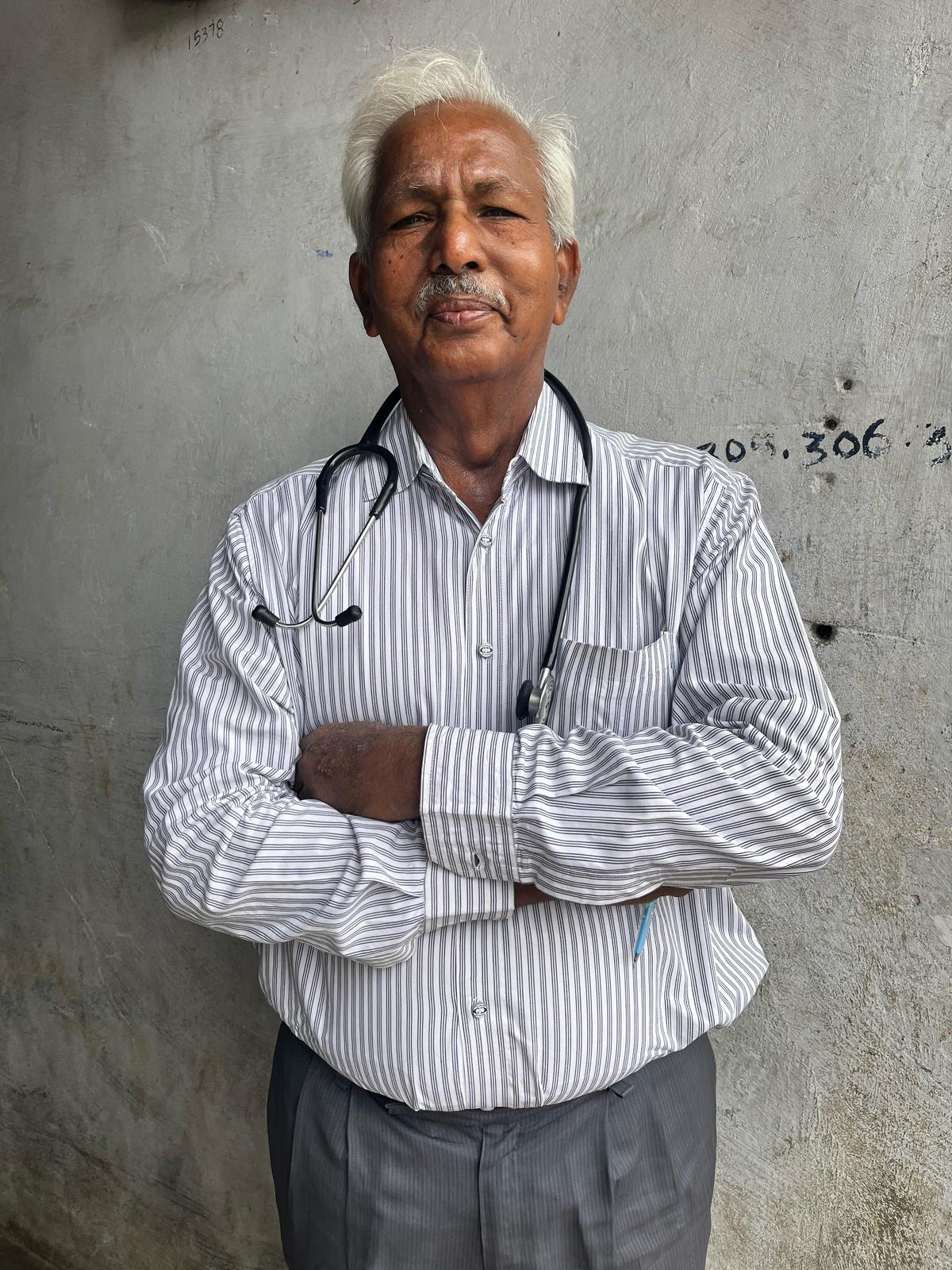Outside his clinic in Suryapet, Dr. K.K. Ranga Reddy | Photo Credit: Prabalika M Borah
On National Doctor’s Day, celebrated every year on 1st July in India, we travel to Suryapet in the state of Telangana to meet Dr. K. Ranga Reddy. His small clinic is on the service road of Warangal, opposite the new bus stand. Here the patients were already waiting in line for the arrival of the doctor. When he arrives, the silver-haired 70-year-old Dr K Ranga Reddy walks from his home a kilometer away. He is Suryapet’s ₹20 doctor – as he charges only ₹20 as consultation fee.
Dr. Reddy’s assistant opened the clinic after his arrival. The clinic consists of two very sparsely furnished rooms, nothing flashy. Patients greet him with namaste and start describing their complaints: body aches, fever, diarrhoea, dizziness… the list goes on. Dr. Reddy first sees the person who needs immediate attention. A young man and a teenage girl. High fever and diarrhea. They need to put IV fluids. After these two he patiently listens to others. He requests me to wait and only after completing the consultation and meeting with the medical representatives, he is ready to narrate his story.
Why does he only take ₹20? He says that he used to charge ₹5 earlier, then increased it to ₹10 and gradually, his patients started giving him ₹20 voluntarily.
highlight
-
Dr. K Ranga Reddy in Suryapet charges patients only ₹ 20. Initially his fee was ₹5
-
He is 70 years old, never forgets to walk to the clinic, has no vehicle of his own
-
Even during the COVID-19 lockdown, Dr Reddy kept his clinic open only to clear doubts of his patients
-
In 1978, he was elected as the student general secretary of Gandhi Hospital. He was later elected as the President
He may be a popular doctor in Suryapet, but he didn’t aim to make a career out of it. He says, “How can a poor man’s son who tills the land have such a dream? Going to school and college and having three meals a day was a luxury for me. That’s why I didn’t aspire to become a doctor. What I dutifully did was attend school and college without fail. I think I was standing there listening to someone who was discussing something enlightened.
Ranga Reddy took the medical entrance exam because of a friend. “My friend suggested that I write the entrance exam as he was doing the same. There were 15 seats reserved from this district and we expected someone or the other to join,” he recalled. He did and completed MBBS from Gandhi Medical College in 1983.
Dr. Reddy recalls with a smile that during his stint in the medical college, his friends encouraged him to contest all the college elections. “I first became general secretary, then student union president and even president; It was a good time. While in the medical college, I could only think that I would be able to treat the needy.”
I keep asking him why his allegations are so trivial. “What do I do with anything I need? What will one do with excess? My aim is to serve. Instead of giving me a hefty tip, they can use that money to buy something and eat.

Dr K Ranga Reddy | Photo Credit: Prabalika M Borah
How about running his household? “I don’t know how my wife managed. He never complained. We were not living a luxurious life. Somehow I was able to give good education to both my sons. I know it must not have been easy at all.
He told that his friends and well-wishers also made space for him to run the clinic. With the income from his practice, Dr. Reddy could not run a big clinic. “I was in loss and behind on my EMIs. Even well-wishers who invested in me could not get their money back on time. Since I didn’t want anyone to suffer because of my principles, I first rented the place to pay off those people’s debt. My sons (settled in Melbourne, Australia) repaid the entire loan once they started earning. My family has been my biggest support in this journey,” he further added.
Till date, Dr. Ranga Reddy does not own any vehicle, he either walks from home to the clinic or takes a ‘shared auto’. “My sons bought a car and asked me to use it. I don’t know how to drive, nor can I afford a driver, so a car is a burden to me. My sons use it when they come home. I also work with an NGO, take autos when I go there; Otherwise, I prefer to walk.”